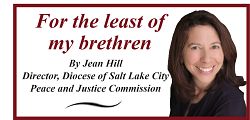Consider Ethical Trade Practices While Doing Your Holiday Shopping and Giving
According to my email inbox, there are seven key tips for avoiding stress during the holidays. There are also three ways to make the holidays more cheerful, five ways to choose the perfect gift, and 10 ways to spruce up my home for holiday entertaining.
Admittedly, I did not read all – OK, any – of these tips. There may be value in knowing how to tie the perfect bow on a present, but my hope for Advent is not to make my house the envy of the neighborhood, my gift-giving skills legendary, or myself crazy trying to pretend I could ever have the skills to be a Good Housekeeping-er. Rather, I hope more simply to live my faith and help others.
My fellow Global Solidarity Team members at the diocese made one small step toward this goal possible. We decided to host an ethical trade sales event for our colleagues. By inviting diocesan staff to share some fellowship at lunch together and do some ethical shopping, we open up an opportunity for all of us to connect with each other and purchase gifts that promote human dignity for those who produce the items as well as those who receive them.
Stories about dangerous working conditions in clothing factories overseas, environmental degradation and child labor violations by chocolate and coffee producers, the loss of sustainable work for people in poverty raise concerns for Catholics who hear God’s call to care for the poor, the vulnerable and creation. We can overlook these concerns in our quest for the ultimate bargain, but Pope Francis compels us to engage with the troubles of the world’s poor. He says, “It is when we say, ‘That doesn’t regard me; it’s not my business; it’s society’s problem.’ It is when we turn away from a brother or sister in need, when we change channels as soon as a disturbing question comes up, when we grow indignant at evil but do nothing about it. God will not ask us if we felt righteous indignation, but whether we did some good.”
There is much good to be done, and many ways to go about it. One way is to be conscientious consumers. Before buying a Hollywood version of Christmas, consider what a faith-filled approach might look like. Catholic Relief Services provides a few questions to consider before making a purchase at any time of year:
Am I fulfilling a need or a want with my purchase?
Will the product bring joy to my life or someone else’s?
Will my purchase effect positive change?
Did making the product cause undue harm to the environment?
Will the product make a positive contribution to my life/society as a whole?
Where is the product from, who made it and what is their life like? How can I keep from overindulging?
These simple questions lead us to think more deeply about not only why we are making a purchase, but also about the global impact of our decision. During Christmas, CRS and its ethical trade partners provide multiple options for gifts that say, “I care about you” AND “I care about others.”
Consider one example. Haiti is one of the poorest countries in the world, with few job opportunities. Within the next 18 months Haiti will have to absorb an influx of roughly 60,000 refugees who will lose their Temporary Protected Status in the United States. Through its partners, CRS tries to ensure Haitians have meaningful work in safe and ethical conditions. Purchases of Singing Rooster coffee, among other items, support rural farmer cooperatives in Haiti. These farmers are paid market rates for their coffee beans, learn to manage their farms for long-term sustainability of the land and their business, and are able to raise their families in their home country. Buying coffee at your local grocery store may be cheaper, but Singing Rooster effects positive change without causing harm to the environment, and it will make a positive contribution to people in Haiti, where a life of dignity may be more difficult to achieve than here.
Ethical trade is one simple change we can make that allows us to say we didn’t just feel indignation, we did some good. Visit ethicaltrade.crs.org to learn more and shop with CRS’ partners for Christmas.
Jean Hill is director of the Diocese of Salt Lake City Peace and Justice Commission.
© Copyright 2024 The Diocese of Salt Lake City. All rights reserved.


Stay Connected With Us